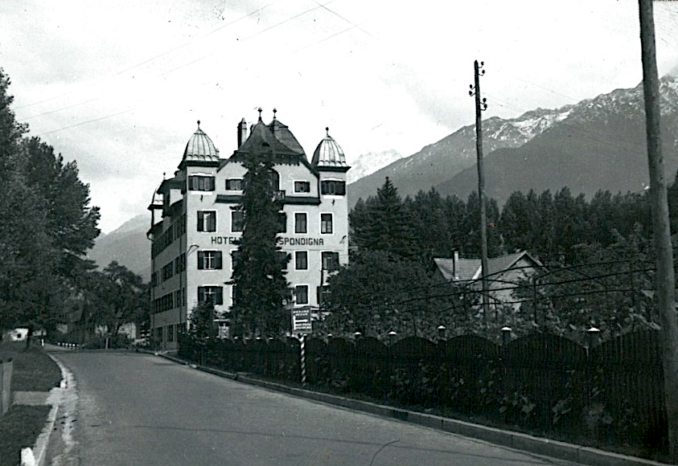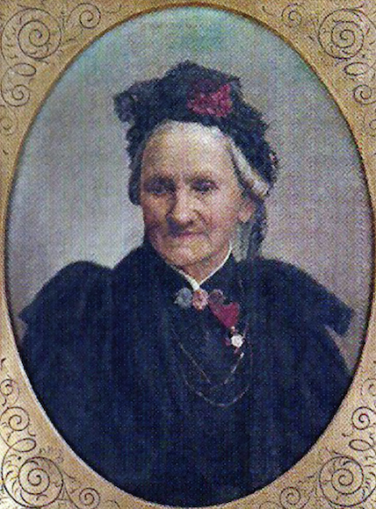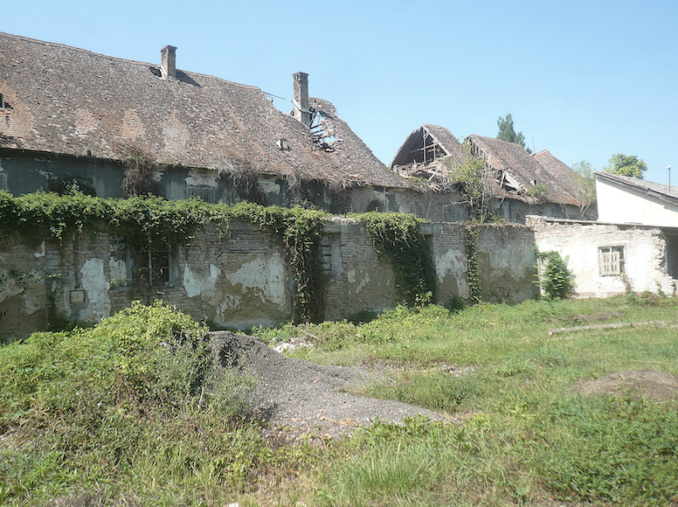Every once in a while, as one turns a page in an old family photo album, one runs the risk of falling across a cause célèbre or even a grisly murder. If, after braving the Brenner Pass, you are unable to face an unfashionably out-of-season Verona, you might strike out westwards for Switzerland and follow the route of the river Adige along the Venosta valley. En route, an obvious port of call is the Posta Hotel at Spondigna (so close to the border with Austria that it is also known as Spondinig) pictured here in 1954 when my father and grandparents visited.

© Always Worth Saying 2022, Going Postal
As well the hotel, the hamlet, if it qualifies as such, consists of five houses and a railway station. At a right angle, the Via Principe runs Roman-straight over the Adige and continues for one and a half miles to the village of Prato del Stelvio beyond which the landscape is reclaimed by mountains and the famous Stelvio pass.
These days the Posta is under repair, covered in scaffolding and sitting beside a new roundabout, the construction of which has eaten into the neighbouring hillside. Locals whisper that a recent mystery buyer is the Zion KC prayer group who are part way converting the baroque building into a place of cultish pilgrimage.
Prior to this hopefully temporary closure, guests reported the Posta gloriously and lovingly neglected. A well-known institution, managed by the same family since it was established in 1862, was rustic and had no telephone. Patchy wifi covered only the ground floor. Food was excellent and consisted of large portions of local dishes. The ambience was very traditional; of vintage furnishings decorated with lush plants and nicely placed historic antiques. Above a wide marble staircase, the 150-year-old grand hotel’s bedrooms were refreshingly not modern.
Floors creaked. Fixtures appeared worn. En-suite facilities added in the 1970s boasted avocado decor. The large rooms beyond were a clash of colours provided by outdated furniture and patterned wallpaper. Guests slept in history. With no air conditioning, no refrigerators and no elevator, the theme was old, old and old with an extra bit of old thrown in. A tour of the hotel was as much a highlight of the stay as exploring the southern Alps literally on the doorstep.
Added to which, Like many a faded continental beauty reduced to standing beside a roundabout in all weathers, the old girl can tell a tale or two.
Established in 1862 by the Hellenstainer hospitality dynasty, a decade or so later the Posta became the focus of a notorious scandal concerning the fate of a certain Monsieur De Tourville (not his real name) and his wife.

Porträt von Emma Hellenstainer,
Ferdinand Behrens – Public domain
But first, a history lesson. Emerentiana Hausbacher was born in the Tyrol in 1818 and was fated to become so famous and noted a gastronomy pioneer that at one time a surface mail letter from the other side of the Atlantic addressed to ‘Miss Emma, Europe’ would find her.
After being trained in household management by the Ursuline sisters in Innsbruck, she was sent to Salzburg to learn cookery and catering at the prestigious “Drei Allierten Hotel”. During this time she wrote a recipe book, inherited a brewery at Toblach and married a Mr Joseph Carl Hellensteiner who had himself inherited a small hotel at Pragser Wildsee in the Dolomites. In the first twelve years of their marriage, the Hellenstainers (family motto ‘you should never smile’) were blessed with five daughters and two sons.
At a time of tourist booms, health spas, an expanding railway network and a popular fascination with Alpinism, Frau Emma and her large family were well-placed to expand their business empire to a series of hotels across Austria which included the Posta. The Habsburg Empire’s socially exalted aristocrats frequented the family’s premises drawing in their wake the top and other shelves of European society. Count Esterházy was a regular guest as was Empress Sissi and her nephew Franz Ferdinand Carl Ludwig Joseph Maria of Austria, better known as Archduke Ferdinand, whose 1914 Sarajevo assassination sparked the First World War – by the end of which Spondinig was in Italian territory and renamed Spondigna.
As for the Posta’s railway line and station, that didn’t appear until the early 20th century via the Vinchgaubahn, subsequently re-named the Ferrovia della Val Venosta, which ran along the valley all the way from Bolzano.
A quarter of a century before, another memorable notable guest was a M. De Tourville. After returning from a summer 1876 walk in the hills, M. de Tourville, accompanied by an impromptu search party, announced to his wife’s startled maid, a Miss Sarah Claperson, that she wouldn’t be seeing her mistress again as the lady had fallen and died during the afternoon. Prone to fits of giddiness, according to her husband, and while under the influence of such a seizure, Madame de Tourville had tumbled over the edge of a precipice. Tellingly the search party muttered amongst themselves in German that her broken parasol was found a distance away from her lifeless body and that M. De Tourville’s hands appeared to be stained in blood.
A few days later and in the middle of the night, de Tourville awakened Miss Claperson and hurried her to pack as they must make their way to Innsbruck en route to England. There, an innkeeper was later to testify to hearing the maid state, ‘Of course he pushed her over the cliff’.
Although subsequently exonerated by an Austrian coroner’s court, M. de Tourville’s prospects darkened as the trustees of his late wife’s estate (as she was a woman of some substance) took an interest in her sudden demise and uncovered several strange matters connected to him.

Stelvio pass,
Damian Morys – Licence CC BY-SA 2.0
Henri de Tourville, a penniless adventurer, had fled to England after wasting his parent’s inheritance. Like many a rogue, he studied law, was called to the bar and became a naturalised British citizen. It emerged he had been married previously but under a different name. His first wife had not been a wealthy woman but was set to inherit from her well-to-do mother. In April 1868 the aforementioned mother-in-law, Elizabeth Bringham, one of the Cheshire Bringhams of Foxley Hall, Lymm, accidentally shot herself in the head with a revolver while the mechanism was being explained to her by M. de Tourville who then lived under the monicker of M. Henri Perrean.
Coroner Mr Nicholson heard that de Tourville had been cleaning the pistol in the breakfast room when the deceased expressed a desire to have its workings explained. De Tourville handed her the weapon and, with one of the chambers loaded, as she handed it back it somehow discharged. With the muzzle pointing towards her, a fatal bullet lodged in the unfortunate lady’s left temple.
Dr Bennett of Lymm, who made the post-portem examination, gave an opinion the gun had been fired in accordance with the evidence given by de Tourville. However, Mr Higham, a Warrington gunsmith, stated he did not think Mrs Bringham could have fired the pistol in the way described. After deliberating for an hour, the coroner’s jury preferred the evidence of the doctor and M. de Trouville over that of the gunsmith and returned a verdict of accidental death.
Armed with this information, the trustees pressed the legal authorities and via a Bow Street court in late November 1876, M. de Trouville was extradited for trial in Austria.
There, more evidence weighed the scales of justice against him. Correspondence with Mr John Turner, a Mr Clark, and Miss Scott showed that the accused kept on changing his story. His wife’s giddiness morphed into an accident and then to a suicide attempt that she survived but successfully repeated after her caring husband had propped her against a tree and set off for help. A Mr Gyln recalled a conversation at a social event many years earlier where M. de Tourville had, unprompted, introduced the topic of ridding oneself of a troublesome mother-in-law by shooting her in the head during the explanation of a revolver mechanism.
By a verdict of eleven to one the accused was found guilty with the judge sentencing him to death, a fate he escaped by the skin of his teeth when commuted on appeal to eighteen years of penal servitude.
The prisoner was despatched to the notorious Gradiska House of Correction, the remains of which (I think) lie on the Croatian side of the River Sava, 25 miles from the Bosnia-Herzegovinian town of Banja Luka. Mawkish Puffins can have a look around here.

Im Hof des ehemaligen Gefängnisses Stara Gradiska,
Fschoepf – Licence CC BY-SA 4.0
Consternation ensued when it was reported the prisoner lived there rather well, more as a boarder than an inmate. He was also claimed to have everything in the way of luxury he wished, and acted in the manner he thought best for his own comfort and convenience. To allay the resulting scandal M. De Tourville let it be known through a letter smuggled to a friend that he was much dissatisfied with his prison treatment and the beautiful views his personal apartment afforded of the banks of the Sava meant little to him as he was obliged to remain there despite that he ought not to be in prison in the first place. He added that he resolved to petition the Minister of Justice in Vienna for a change of residence.
There the matter of the various late Madame de Trouvilles’ estates might have rested but for an unsolicited letter ten years later. By 1887 it was rumoured that M. de Tourville had perished in prison. It was also thought that the convicted murderer’s son from his first marriage, confusingly also called Henri, had, having survived the fire, later drowned in the Bay of Naples.
The letter was addressed to Mr Justice Kay of the Chancery Division and contained an affidavit claiming that the young de Tourville was not only still alive but attending an English school under a false name and remained the rightful heir to his grandmother’s Bringham estate. Justice Kay blamed the lawyers for the tangle and found on behalf of de Tourville junior who one suspects, in the modern style, might have been a 50-year-old schoolboy recently arrived illegally from the continent having faked his own death and escaped from an Austrian prison.
© Always Worth Saying 2022


